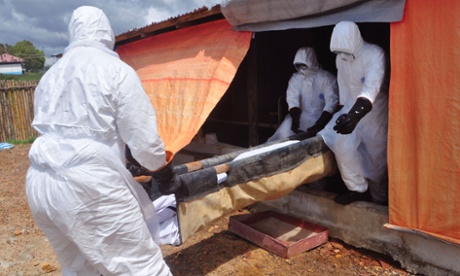Sierra Leone, Guinea and Liberia in line for further help from fund following international pressure

The International Monetary Fund (IMF) is expected to use the G20 summit in Brisbane to announce a debt relief programme for three west African countries worst affected by the Ebola outbreak.
The proposal is likely to be contained in a separate communique issued after dinner at the G20 by Australia, the host of the summit in Brisbane.
The US had been pressing the IMF to offer $100m in debt relief to the three worst-affected countries: Sierra Leone, Guinea and Liberia, and it is not clear whether a precise figure will be put on the amount of debt relief in the communique.
The British prime minister, David Cameron, has joined the US in pushing to put Ebola on the agenda of a summit that Australia had been trying to focus rigidly on economic growth and jobs.
The IMF has already agreed to provide $130m of emergency financial assistance, including $48.3m to Liberia, $41.4m to Guinea and $39.8m to Sierra Leone. It is also empowered to offer debt relief in such emergencies if required.
The IMF had previously estimated the epidemic would be brought under control by the first quarter of 2015, but now believed this was likely to be the second half of the year, increasing the cost to the countries affected. It has forecasted that growth estimates for the three countries is likely to be downgraded.
Before the summit, the US treasury secretary, Jack Lew, formally called on the IMF to provide the debt relief, saying it “will promote economic sustainability in the worst-hit countries by freeing up resources for both immediate and long term recovery efforts”. He said the money could be found by drawing from the IMF’s post-catastrophe debt relief trust used to cancel Haiti’s debt in the wake of the 2010 earthquake.
More than 5,000 people have died from Ebola according to the World Health Organisation and although the daily number of new cases is declining, the virus is still appearing in new areas in the region.
Separately, Cameron has been pressing G20 members that have given little to help to the crisis either in straight donations or gifts in kind to rethink their priorities.
The possibility of a future pandemic relief fund, which has been proposed by the World Bank, may also be mentioned in the final G20 communique. Such a fund would be designed to ensure that a response to a future health crisis is not as slow as the response to Ebola.
The World Bank Group president, Jim Yong Kim, said in a briefing in Brisbane the initial response had been late, adding: “Ebola is not a disease where you can leave a few cases and then say you have done enough. You have really got to get every country to zero.”
Setting out his idea of a pandemic fund he said: “We have funds to protect from other downside risks to the global economy. Pandemics, epidemics, are in fact very real downside risks to the global economy. They are also human tragedies and they are public health emergencies”.
Kim said his proposal for a fund would make possible a global public health corps ready to respond at a moment’s notice, “a fund that would disburse millions and then also many billions of dollars if necessary”. He added that the proposed fund would also act as a very advanced market signal to vaccine- and drug-makers.
Cameron is also pressing for pharmaceutical companies to be offered indemnities to ensure some vaccines can be fast tracked without great financial risk to the business.
